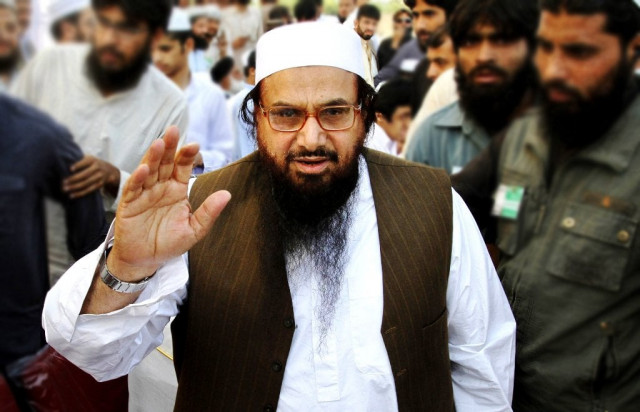Hafiz Saeed challenges presidential decree
In plea before IHC, JuD chief calls ordinance an effort to undermine country’s sovereignty

PHOTO: FILE
President Mamnoon Hussain in February signed the ordinance amending the Anti-Terrorism Act (ATA), 1997 with the aim of tightening the noose around individuals and organisations banned by the UNSC.
The move was apparently aimed at declaring JuD and its charity arm, the Falah-e-Insaniat Foundation (FIF), as proscribed groups ahead of the Financial Action Task Force (FATF) meeting in Paris which decided to put Pakistan on the anti-terror financing organization’s grey list from June this year.
The ordinance amended Sections 11-B which sets out parameters for proscription of groups and 11-EE which describes the grounds for listing of individuals of ATA.
Both the sections now include Sub-Section ‘AA’, according to which organisations and individuals “listed under the UN (Security Council) Act, 1948 (XIV of 1948)” will be included in the First Schedule (for organisations) and Fourth Schedule (for individuals), respectively, on an ex-parte basis.
FATF grey list: 148 properties of JuD, FIF confiscated in Punjab
After promulgation of the ordinance, all properties of the FIF were confiscated in Azad Jammu and Kashmir and Gilgit-Baltistan. Some 148 properties and assets of the outfits were also seized in Punjab.
Challenging the ordinance, Saeed through his counsel Raja Rizwan Abbasi said the ordinance is illegitimate and injurious to the country and a calculated effort to undermine its sovereignty.
In the petition, the ordinance has been promulgated wherein authority of declaring proscribed has been given to the United Nations. The ordinance is violative of law negating the sovereignty of Pakistan hence liable to be declared unconstitutional,” he contended.
By virtue of the ordinance, Abbasi said, powers have been given to the United Nations which is dominated by “USA and different other enemy countries which are termed as G-8.” He said promulgation of the ordinance and addition of Sec 11 EE is not only prejudicial to the sovereignty but also violative of Article 9, 10, 10-A, 14, 15, 16, 19, 20, 23, 24 and Chapter II of the Constitution.
LHC orders release of JuD chief Hafiz Saeed
He said now the question arises if the UNSC declared judiciary, army and Pakistan atomic energy commission as proscribed then what would be the effect of its addition in section 11EE of ATA.
“How authority to amend the ATA can be given to the UNSC as it is the only job of parliament or federal government,” he added.
Responding to the petition, the IHC Justice Aamer Farooq issued notices to the principal secretary to the president and the secretaries of law, cabinet division and establishment division after preliminary hearing. The court also directed the respondents to submit reply and para-wise comments in the case



















COMMENTS
Comments are moderated and generally will be posted if they are on-topic and not abusive.
For more information, please see our Comments FAQ